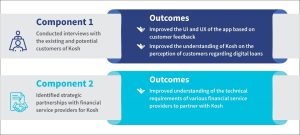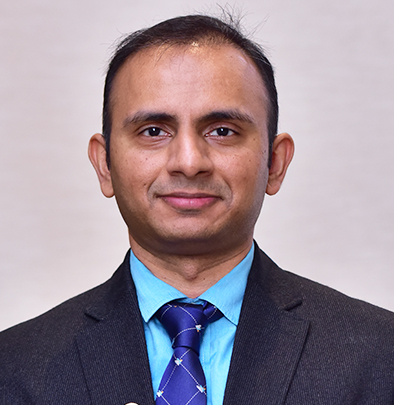Kosh: A community-based credit platform that offers financial security to blue-collar workers
by Shweta Menon, Diya Chatterjee, Anshul Saxena and Anil Gupta
Aug 11, 2021
6 min
Kosh is a digital lending platform that provides access to formal credit to low- and middle-income (LMI) segments in India. It works on a joint liability model that relies on group leaders and members who avail credit through the platform. This blog explores the journey of Kosh and the positive impact it hopes to create on LMI segments.
This blog talks about Kosh, a start-up that is part of the Financial Inclusion Lab. The Lab is an accelerator program supported by some of the largest philanthropic organizations across the world, such as the Bill & Melinda Gates Foundation, J.P. Morgan, Michael & Susan Dell Foundation, MetLife Foundation, and Omidyar Network.
Suresh, aged 40, works at a manufacturing firm in Haryana. He needed some money urgently to pay his daughter’s school fees. However, he did not want to fall prey to the usurious rates local money lenders charge. Suresh was also not comfortable asking his family members for money. He came to know about Kosh from a colleague and decided to approach the platform for a loan. Suresh was delighted with the quick processing and disbursement of the loan. Today, he is an active borrower at Kosh. With a good repayment history and the leads he has generated for Kosh, Suresh has now graduated to the role of a group leader.
India is home to more than 120 million blue-collar workers like Suresh. Most of these workers struggle with a lack of financial awareness and have limited access to affordable financial solutions. Financial institutions are reluctant to serve these customers due to the high cost of acquisition (CAC) and a high operational cost. This gap between financial institutions and customers, albeit in a group setting, offers an opportunity for start-ups like Kosh.
The light-bulb moment
Founded in 2018, Kosh is a digital lending platform that provides community-based credit through its mobile application, primarily to blue-collar workers who reside in tier-2 and tier-3 cities.
Co-founders Aayush and Sahil know each other since high school and used to work together at a global investment banking firm before founding Kosh. During their time together, they spoke to multiple gig-economy workers, such as drivers, food delivery personnel, and factory workers. These interactions helped them realize the struggle blue-collar workers face to access affordable credit. These workers also find it difficult to manage their finances efficiently. The occasional chat soon turned into full-fledged interactions with blue-collar workers to gather a detailed understanding of the challenges they face to access formal financial services.
Sahil and Aayush discovered their mutual passion for solving issues related to financial access and usage for the low- and middle-income (LMI) segment. Soon after, moved by the plight of many like Suresh, Sahil and Aayush decided to set up Kosh. Their idea was to offer the LMI segment a platform to gain awareness of financial programs and to access formal financial services at affordable rates.
What makes Kosh unique?
Kosh is one of the few players in the digital lending space that gives importance to social capital in communities to which their customers belong. Despite having a fully digital model, Kosh is passionate about understanding the community. Kosh capitalizes on the belief that such customer segments use their close social circles for liquidity farming to help each other financially, and exchange credible financial information and advice.
Kosh uses this social capital to verify the background of potential customers before it processes and disburses loans. Trusted colleagues or influencers in the community act as guarantors on the platform and Kosh onboards them as group leaders. These leaders are tasked to create a group of two or three members to avail credit from the platform. All members, including the group leader, need to repay each loan installment on time.
Kosh also offers financial incentives to group leaders to onboard others in their network. This places the onus on the group leaders to introduce more users to the platform. This joint liability model based on social capital helps Kosh provide credit, especially to vulnerable segments. Access to credit also opens opportunities for these customer segments to access a bouquet of other formal financial services, which enables Kosh to make a meaningful impact in their overall financial lives.
The joint liability model also offers several other advantages to Kosh, a few of which are as follows:
- Lower cost of acquisition: The onus to form a group is on the group leader, which reduces the customer acquisition cost for Kosh.
- Fewer defaults: The group creates social pressure on the members to maintain discipline and repay the installments on time.
- Opportunity to offer a suite of financial products: Kosh can use the data collected during the lending process to further design financial services customized to these segments.
Kosh follows a simple digital onboarding process to acquire customers. Moreover, the app provides a group chat facility for its customers to discuss their queries and concerns with each other and the Kosh team. Kosh also offers complete parallel support through WhatsApp and over calls to help customers complete their registration process and get their other queries addressed. The frequent interaction, both among the members and the team, helps build mutual trust.
Roadblocks in its journey
Despite a good start to its journey, Kosh faced a few roadblocks. The first major barrier came after the decision of the Reserve Bank of India to offer a moratorium to borrowers from March, 2020 as a relief measure during COVID-19. Many customers believed that their loans were waived. This behavior affected the collection rates of Kosh. However, the start-up adopted a proactive approach and actively engaged and informed these customers about the importance of timely repayment, which helped them pull through.
The second major roadblock is around the adoption of products and scale-up. Currently, Kosh depends on its contacts or existing networks to onboard group leaders. So far, the startup has only worked with blue-collar segments and most of its business development is through existing networks. This limits growth and creates barriers to scale-up. Kosh continues to actively explore new avenues to boost its business, even as it keeps existing customer segments engaged.
Support from the FI lab
As part of the Lab’s accelerator program, MSC supported Kosh with a set of technical assistance (TA) activities, as described below:
- MSC derived additional insights from the feedback of existing and potential customers of Kosh. This helped the start-up understand the perception of customers about availing group loans through a digital platform. Equipped with better knowledge of its current and target segment, Kosh designed a more customer-friendly application process based on the UI/UX insights.
- In a quest to scale up, Kosh wished to explore partnerships with financial service providers, such as NGOs, MFIs, and other non-lending FinTechs. These organizations would be best suited for collaboration as their efforts also focus on serving LMI segments through relevant products and services. Such collaborative efforts would help Kosh grow its business further. Based on its offerings and requirements of potential partners, MSC helped Kosh identify a few such partners.
As a part of its short-term vision, Kosh plans to scale up and boost customer acquisition aggressively. Kosh is aware of the need to optimize its loan repayment management system to scale up. It also needs to strengthen the group incentive structure to minimize defaults. As a part of the FI Lab, MSC continues to work closely with Kosh to strengthen its business model and devise appropriate strategies to improve business operations.
Plans for the future
Along with higher customer acquisition, Kosh aspires to transform into a financial services platform that offers a host of community-based services, such as credit, savings, employment opportunities, and others to blue-collar workers in tier-2 and tier-3 cities. Kosh intends to use technology extensively to create a network of employees across different industries and regularly engage them on the platform to collect data. This data will help Kosh design and offer customized services to its customers in the future.
Further, Kosh plans to develop its next-generation group savings product by understanding the savings behavior of self-help groups (SHGs) and members of cooperatives. This will help Kosh digitize community savings on its platform, like a digital rotating savings and credit association (ROSCA). To achieve this goal, Kosh plans to partner with a few MFIs, SHGs, and other FinTech players to further strengthen its business and expand its reach.
Despite a brief setback due to the pandemic, Kosh managed to get back on track toward its goal of alleviating the financial struggles of customers like Suresh. Kosh intends to become a leading digital-first financial services platform that offers greater control to customers over their finances, thereby creating a positive impact in their lives.
This blog post is part of a series that covers promising FinTechs that make a difference to underserved communities. These start-ups receive support from the Financial Inclusion Lab accelerator program. The Lab is a part of CIIE.CO’s Bharat Inclusion Initiative and is co-powered by MSC. #TechForAll, #BuildingForBharat
 by
by  Aug 11, 2021
Aug 11, 2021 6 min
6 min 





Leave comments